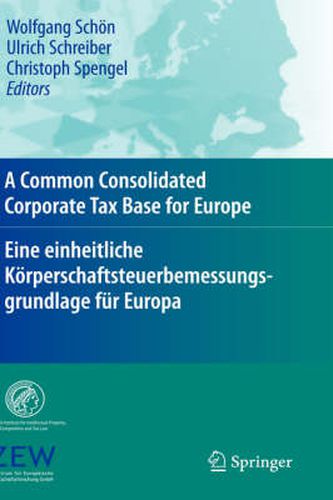Readings Newsletter
Become a Readings Member to make your shopping experience even easier.
Sign in or sign up for free!
You’re not far away from qualifying for FREE standard shipping within Australia
You’ve qualified for FREE standard shipping within Australia
The cart is loading…






This title is printed to order. This book may have been self-published. If so, we cannot guarantee the quality of the content. In the main most books will have gone through the editing process however some may not. We therefore suggest that you be aware of this before ordering this book. If in doubt check either the author or publisher’s details as we are unable to accept any returns unless they are faulty. Please contact us if you have any questions.
Preface This book contains the proceedings of the International Tax Conference on the c- th th mon consolidated corporate tax base (CCCTB) that was held in Berlin on 15 - 16 may 2007. The conference was jointly organised by the German Federal Ministry of Finance, the Centre for European Economic Research (ZEW), Mannheim, and the Max Planck Institute (MPI) for Intellectual Property, Competition and Tax Law, Munich. More than 250 participants from all over Europe and other regions, scholars, politicians, business people and tax administrators, discussed the Eu- pean Commission’s proposal to establish a CCCTB. Three panels of tax experts evaluated the common tax base with respect to structural elements, consolidation, allocation, international aspects and administration. The conference made clear that the CCCTB has the potential to overcome some of the most intriguing problems of corporate income taxation within the Common Market. Common tax accounting rules substantially reduce compliance and administrative costs. Consolidation of a group’s profits and losses effects cro- border loss compensation which removes a major tax obstacle for European cro- border investment. At the same time, tax planning with respect to financing and transfer pricing is pushed back within the European Union. Moreover, as far as the CCCTB applies, member states are able to remove tax provisions that are targeted at cross border tax evasion and that might be challenged by the jurisdiction of the Eu- pean Court of Justice.
$9.00 standard shipping within Australia
FREE standard shipping within Australia for orders over $100.00
Express & International shipping calculated at checkout
This title is printed to order. This book may have been self-published. If so, we cannot guarantee the quality of the content. In the main most books will have gone through the editing process however some may not. We therefore suggest that you be aware of this before ordering this book. If in doubt check either the author or publisher’s details as we are unable to accept any returns unless they are faulty. Please contact us if you have any questions.
Preface This book contains the proceedings of the International Tax Conference on the c- th th mon consolidated corporate tax base (CCCTB) that was held in Berlin on 15 - 16 may 2007. The conference was jointly organised by the German Federal Ministry of Finance, the Centre for European Economic Research (ZEW), Mannheim, and the Max Planck Institute (MPI) for Intellectual Property, Competition and Tax Law, Munich. More than 250 participants from all over Europe and other regions, scholars, politicians, business people and tax administrators, discussed the Eu- pean Commission’s proposal to establish a CCCTB. Three panels of tax experts evaluated the common tax base with respect to structural elements, consolidation, allocation, international aspects and administration. The conference made clear that the CCCTB has the potential to overcome some of the most intriguing problems of corporate income taxation within the Common Market. Common tax accounting rules substantially reduce compliance and administrative costs. Consolidation of a group’s profits and losses effects cro- border loss compensation which removes a major tax obstacle for European cro- border investment. At the same time, tax planning with respect to financing and transfer pricing is pushed back within the European Union. Moreover, as far as the CCCTB applies, member states are able to remove tax provisions that are targeted at cross border tax evasion and that might be challenged by the jurisdiction of the Eu- pean Court of Justice.